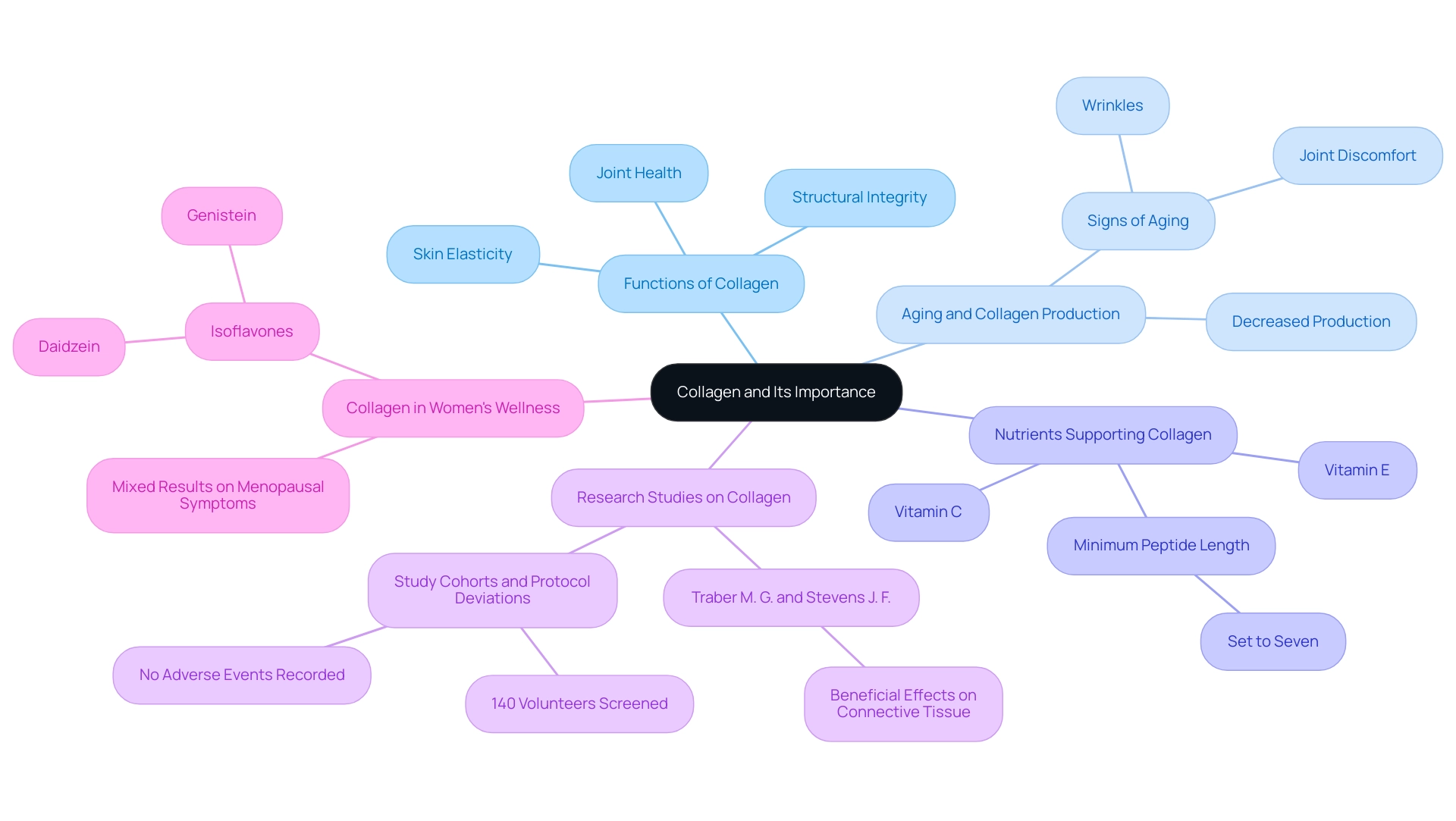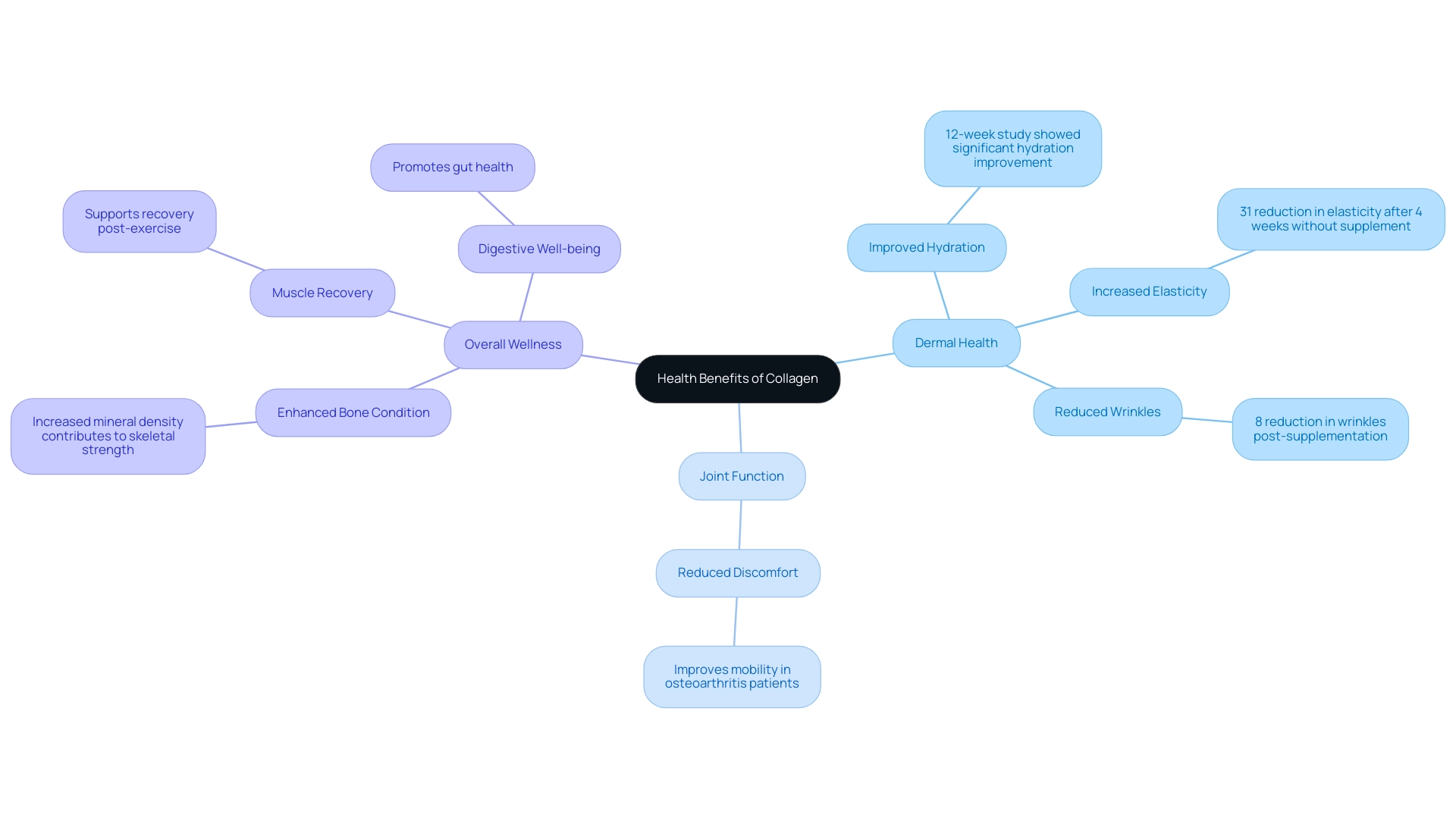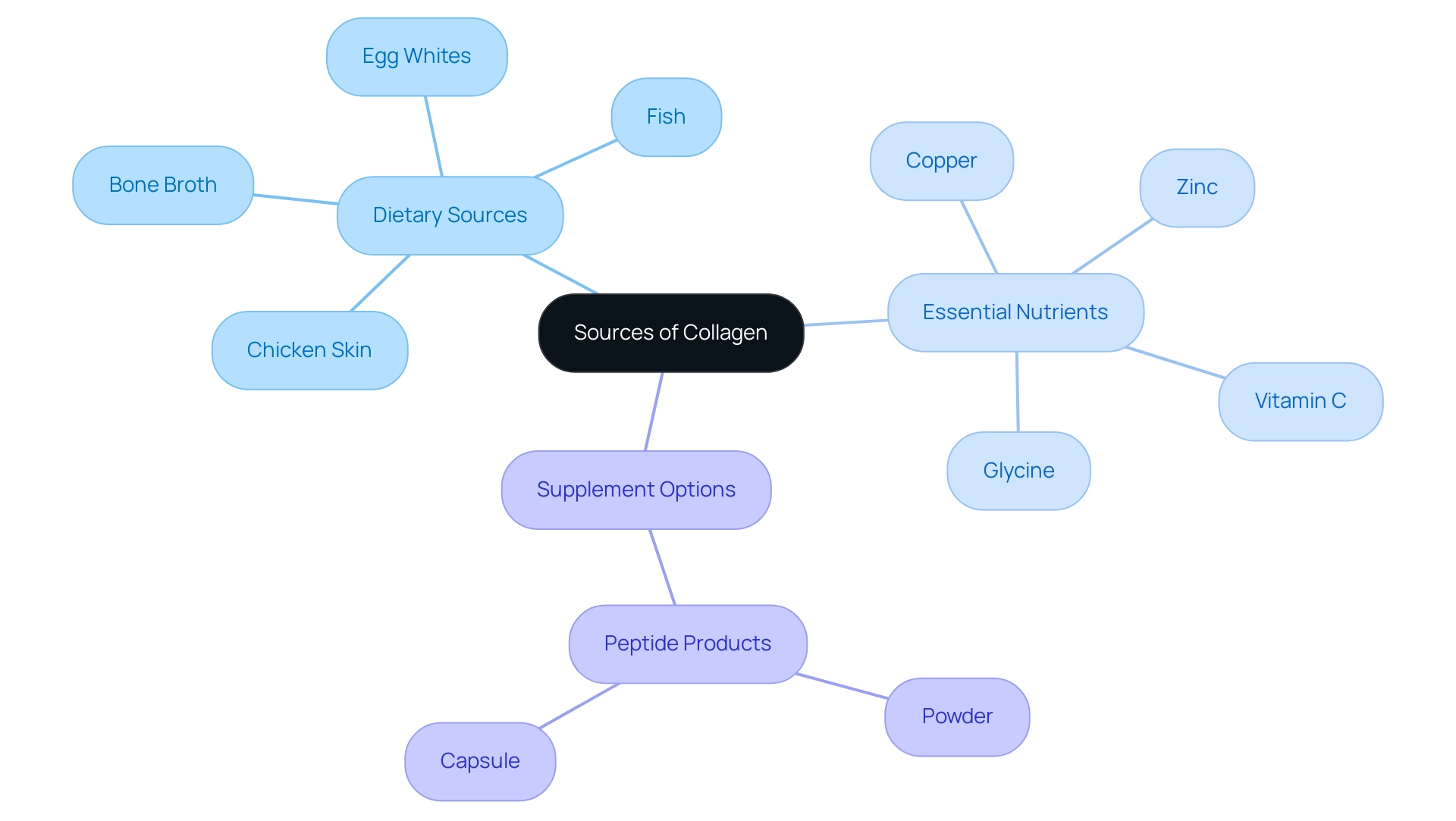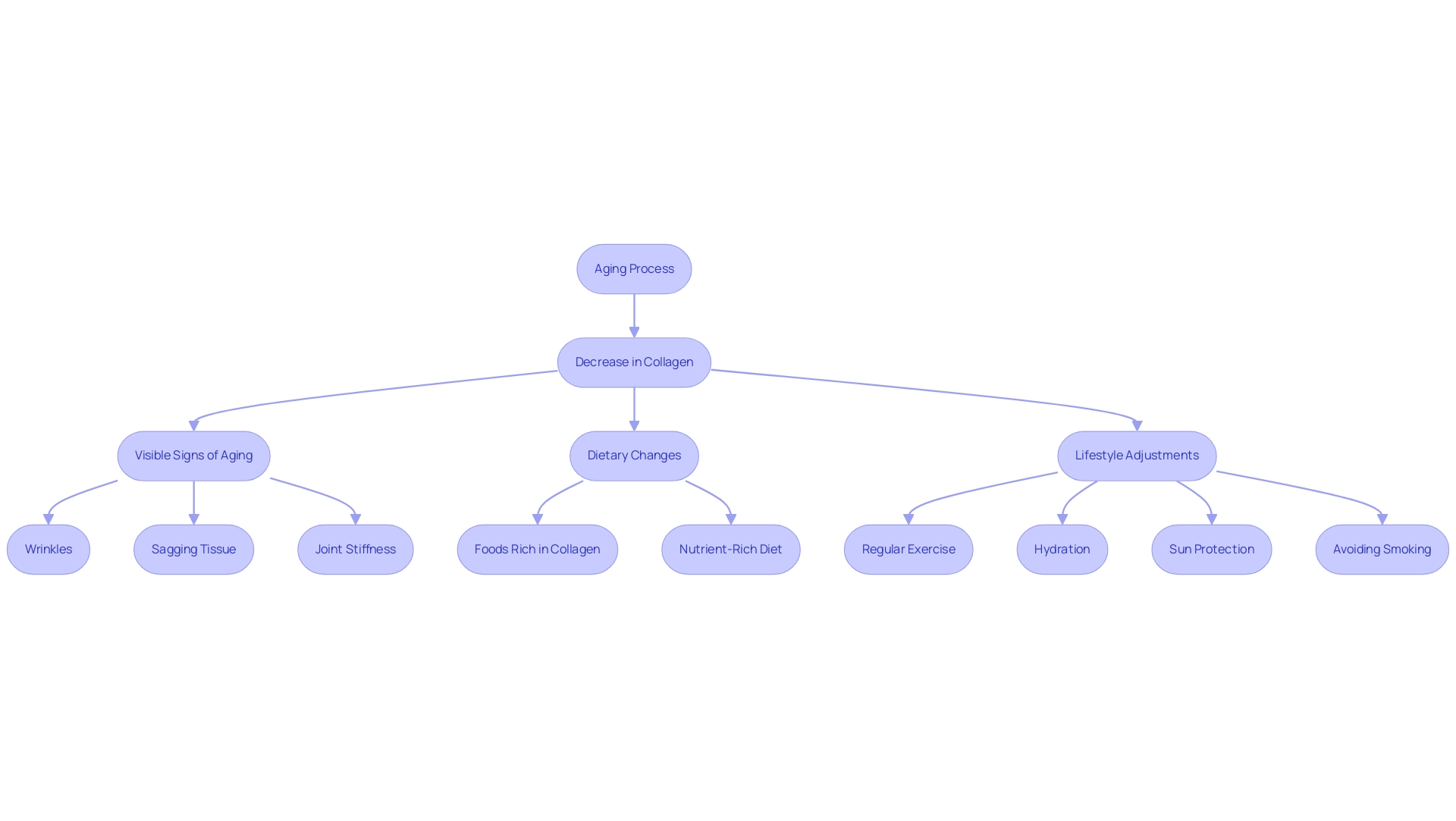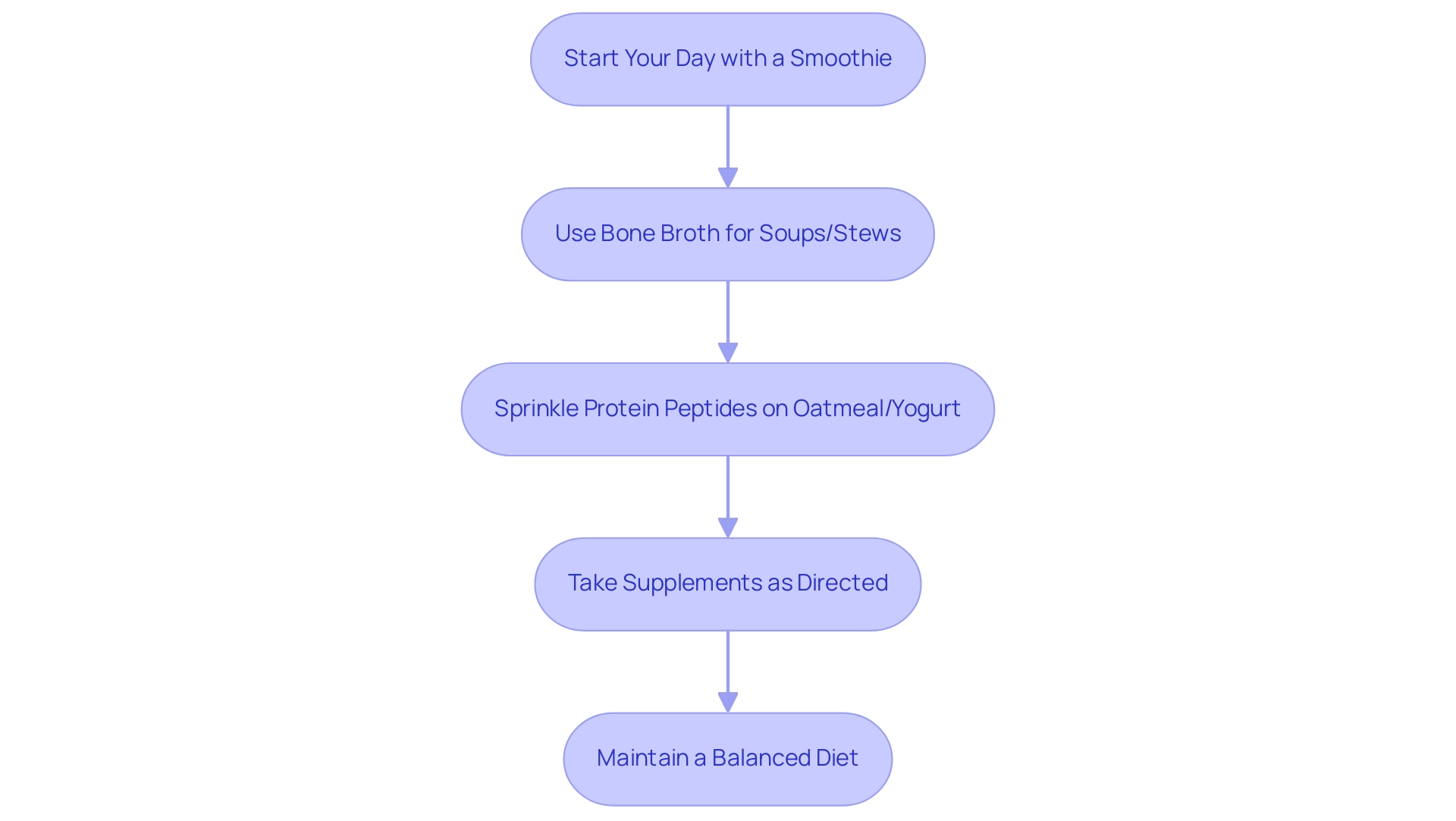Introduction
Collagen plays a crucial role in maintaining the structural integrity and overall health of the body, comprising a significant portion of the protein content in mammals. As a key component of connective tissues, collagen supports everything from skin elasticity to joint health.
However, the natural production of collagen begins to decline with age, leading to visible signs of aging and discomfort. Recent research highlights not only the importance of collagen in various health aspects but also the potential benefits of dietary and supplemental sources.
This article delves into the multifaceted nature of collagen, exploring its health benefits, dietary sources, and practical ways to incorporate it into daily routines, ultimately shedding light on its vital role in promoting vitality and well-being.
1. What is Collagen and Why is it Important?
Collagen, an essential protein, makes up around 30% of the overall protein content in mammals and acts as a crucial element of connective tissues, which encompass dermis, tendons, ligaments, cartilage, and bones. Its primary functions include the collagen benefits of maintaining skin elasticity, joint condition, and overall structural integrity. As people get older, the production of connective tissue decreases, leading to notable signs of aging such as wrinkles and joint discomfort.
Recent studies emphasize the critical importance of this protein in health, particularly as it pertains to connective tissues. Research conducted by Traber M. G. and Stevens J. F. highlights the beneficial effects of vitamins C and E in supporting connective tissue synthesis, emphasizing the necessity of these nutrients in the diet. Additionally, the minimum peptide length for effective support has been established at seven, which is crucial for optimal absorption and efficacy.
Additionally, an investigation involving 140 screened participants, where 138 were enrolled and assigned to treatment and placebo groups, evaluated the effects of a particular protein supplement. The research showed no negative occurrences and proposed a favorable safety profile, indicating that protein supplements can be a safe addition to wellness routines. In the context of women's wellness, isoflavones such as genistein and daidzein found in soy products have been studied for their potential benefits on menopausal symptoms, though results have been mixed.
Grasping the complex function of this protein is crucial for individuals aiming to improve their well-being, as the collagen benefits greatly aid in numerous bodily processes and enhance general vitality. As noted by Collin Y. Ewald, 'K.T. and C.Y.E. composed the manuscript in communication with the other contributors, emphasizing the joint endeavor in enhancing our comprehension of its function in well-being.
2. Exploring the Health Benefits of Collagen: From Skin to Joints
Collagen is famous for its numerous health advantages, particularly for its collagen benefits in dermal health, joint function, and overall wellness. Recent clinical research shows that protein supplementation considerably
improves hydration and elasticity of the dermis, effectively reducing the visibility of wrinkles and promoting a more youthful appearance. Notably, a two-arm clinical study comparing the test product against a placebo over twelve weeks demonstrated that the effects on hydration, elasticity, roughness, and density were markedly superior to those observed in the placebo group.
Post-supplementation assessments revealed that tissue density reduced to 36.7 ± 6.9 µm after four weeks without the test product, highlighting the durability of its effects. Additionally, findings from the exploratory postsupplementation phase showed a decrease in hydration by 4%, a 31% reduction in elasticity, and only an 8% reduction in wrinkles, highlighting the measurable loss of skin benefits after discontinuation of the supplement and underscoring the importance of continued protein intake. Moreover, the collagen benefits of this protein are crucial for joint function, as it aids in reducing discomfort and improves mobility, especially in people experiencing osteoarthritis.
By enhancing bone condition through increased mineral density, collagen contributes to skeletal strength. Furthermore, it assists in muscle recovery and promotes digestive well-being, making it a valuable addition to any wellness regimen. Including collagen-rich foods or supplements can result in significant enhancements in wellbeing outcomes, showcasing the collagen benefits and ultimately improving one’s overall quality of life.
As noted by Oikawa et al., all included studies were double-blinded and placebo-controlled, lending further credibility to the findings surrounding the substance's efficacy in health and wellness.
3. Sources of Collagen: Dietary and Supplement Options
The protein is readily available from a variety of dietary sources, including:
- Bone broth
- Chicken skin
- Fish
- Egg whites
These sources are abundant in the amino acids essential for its synthesis. Glycine, noted as the most abundant amino acid, is particularly crucial in this process. Moreover, certain nutrients, such as vitamin C, zinc, and copper, are essential for the production of connective tissue and can be sourced from a diverse array of fruits, vegetables, nuts, and seeds.
Recent studies indicate that protein intake averages 1.26 ± 0.46 g/kg/bm for individuals consuming peptide supplements, compared to 1.18 ± 0.27 g/kg/bm for those on a placebo, highlighting the nutritional impact of these sources. Additionally, dairy protein consumption correlates positively with bone strength in postmenopausal women, underscoring the significance of dietary sources abundant in this protein. For individuals choosing supplements, peptide products are conveniently available in both powder and capsule forms, allowing for easy incorporation into smoothies, soups, or other meals.
It is important to note that
research on protein supplements is currently lacking, and when selecting these supplements, it is advisable to choose hydrolyzed protein, as this form is more efficiently absorbed by the body. It remains essential to consult with a healthcare professional before initiating any new supplement regimen to ensure it aligns with your health objectives.
4. The Role of Collagen in Aging: What You Need to Know
As people advance in age, the natural generation of connective tissue decreases, resulting in visible indicators of aging such as wrinkles, sagging tissue, and joint stiffness. Research indicates that this decline can commence as early as the late 20s or early 30s, with studies revealing a staggering
68% reduction in Type I procollagen content in older tissue compared to that of younger individuals. Significantly, the thickness of the reticular dermis grows until adulthood, attaining its peak thickness around the fourth decade of life, highlighting the importance of preserving connective tissue for dermal integrity.
Furthermore, the thickness of connective tissue and bundle orientation parameters demonstrate considerable changes with age, indicating alterations in tissue structure over a lifetime. To alleviate these effects, it is essential to embrace a diet abundant in connective tissue and other nutrients that offer collagen benefits. Consistent exercise has also been demonstrated to boost collagen benefits by increasing the production of connective tissue, thereby improving the overall health of the body and joints.
Moreover, essential tactics like ensuring adequate hydration, protecting the surface from sun harm, and refraining from smoking can greatly assist in sustaining elasticity and foster a more youthful look. As Amparo Ruiz Saurí observes, 'Grasping the dynamics of this protein in our skin is crucial for creating effective methods to address the visible signs of aging.' By proactively implementing these measures, individuals can help maintain their connective tissue levels, which ultimately enhances the collagen benefits for their overall health and well-being as they age.
5. How to Incorporate Collagen into Your Daily Routine
Including this protein in your daily routine can be both simple and enjoyable. One effective way to start the day is with a smoothie enriched with protein; simply add the powder to your favorite mix of fruits and vegetables. Alternatively, consider using bone broth as a nutritious base for soups or stews, significantly boosting your protein intake.
For a simple enhancement to your breakfast, sprinkle protein peptides into your oatmeal or yogurt. If you prefer supplements, consume them according to the instructions, whether in the morning or evening, based on your individual preference. Consistency in incorporating these collagen-rich options into your meals is crucial to experiencing the full spectrum of collagen benefits.
Furthermore, maintaining a balanced diet abundant in vitamins and minerals is crucial as it aids your body’s natural protein production. C.P. notes that the effective amounts of functional protein peptides observed in literature suggest daily intakes ranging from 2.5 to 15 grams, reinforcing the importance of regular consumption.
Additionally, a randomized trial involving 503 RA patients assessed chicken type II protein, emphasizing its possible advantages for joint function. As trends in supplement usage continue to rise in 2024, particularly in light of recent findings that
endoscopic injections have significantly improved reflux symptoms for patients with severe GERD, exploring innovative recipes and methods to incorporate this protein into your meals remains a valuable approach to enhancing overall health and wellness. Additionally, insights from a study on the amino acid composition of collagen peptides reveal that certain dietary sources, such as porcine collagen, offer high protein quality, making them suitable for inclusion in a balanced diet.
Conclusion
Collagen is an essential protein that plays a pivotal role in maintaining the body's structural integrity, influencing everything from skin elasticity to joint health. As highlighted throughout the article, the natural decline of collagen production with age can lead to visible signs of aging and discomfort, underscoring the importance of both dietary and supplemental sources to support health and wellness.
The health benefits of collagen are substantial, particularly in enhancing skin hydration, elasticity, and overall appearance. Clinical studies demonstrate that consistent collagen supplementation can yield significant improvements in skin quality and joint function, contributing to a higher quality of life. Moreover, the article emphasizes the critical role of specific nutrients, such as vitamin C, in promoting effective collagen synthesis, illustrating the need for a well-rounded approach to nutrition.
Incorporating collagen into daily routines can be straightforward and rewarding. From collagen-infused smoothies to bone broth in meals, there are numerous practical ways to boost collagen intake. Regular consumption of collagen-rich foods and supplements not only supports skin and joint health but also enhances overall vitality. As individuals seek to maintain their well-being and combat the effects of aging, understanding and utilizing collagen's benefits becomes increasingly vital. Prioritizing collagen in dietary choices can lead to lasting improvements in health and wellness over time.
